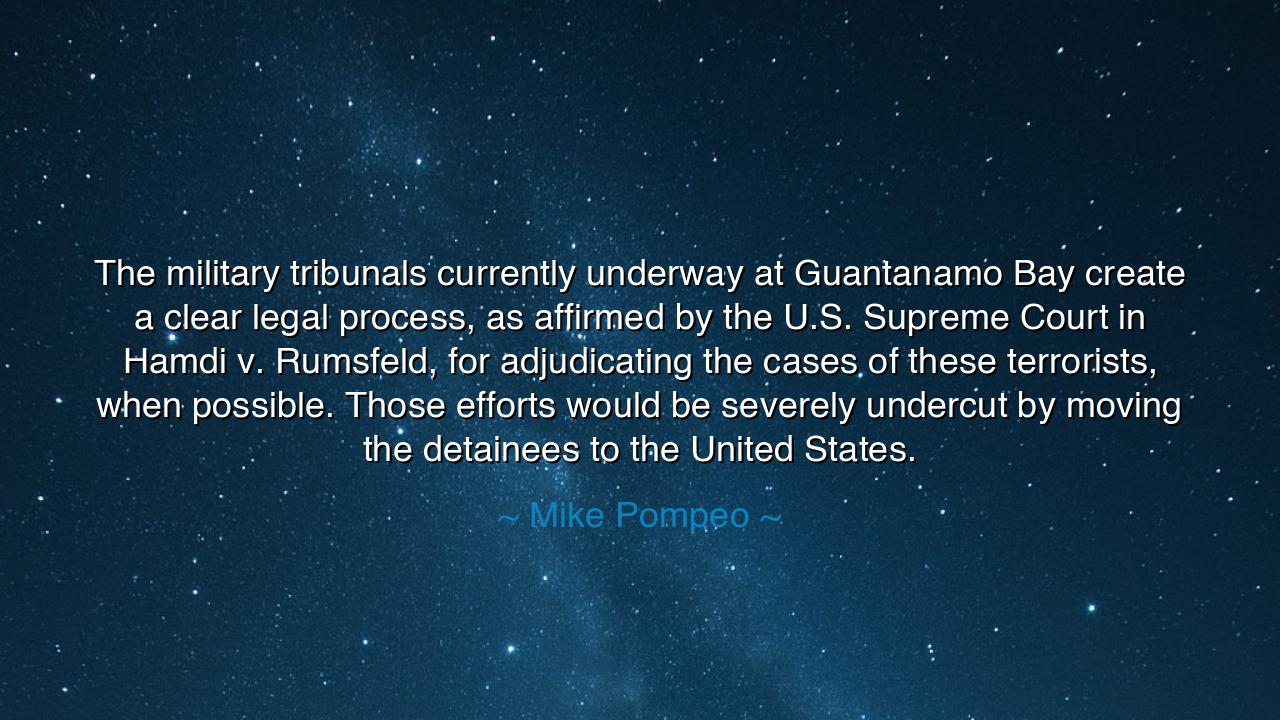
The military tribunals currently underway at Guantanamo Bay
The military tribunals currently underway at Guantanamo Bay create a clear legal process, as affirmed by the U.S. Supreme Court in Hamdi v. Rumsfeld, for adjudicating the cases of these terrorists, when possible. Those efforts would be severely undercut by moving the detainees to the United States.






When Mike Pompeo declared, “The military tribunals currently underway at Guantanamo Bay create a clear legal process, as affirmed by the U.S. Supreme Court in Hamdi v. Rumsfeld, for adjudicating the cases of these terrorists, when possible. Those efforts would be severely undercut by moving the detainees to the United States,” he was not merely speaking about law — he was speaking about the fragile balance between security and justice, between the demands of war and the ideals of liberty. In his words echoes an ancient struggle: how does a nation protect itself without becoming the very thing it fears? His statement is a defense of order amidst chaos, of legal restraint in the face of violent uncertainty.
The origin of this quote lies in the years after the September 11 attacks, when America found itself fighting an enemy without borders — an invisible foe that wore no uniform, held no flag, and followed no nation’s code. In that hour, Guantanamo Bay became both fortress and symbol: a place where the United States sought to detain and judge those accused of terror, outside the ordinary courts of the land. Pompeo’s defense of the military tribunals reflects a belief that extraordinary threats require extraordinary measures, that a separate system of justice — rooted in the discipline of the armed forces — must handle those who wage war from the shadows.
When Pompeo invokes Hamdi v. Rumsfeld, he reaches into the heart of the American legal tradition, for that Supreme Court case was a reckoning between executive power and individual rights. The Court, while recognizing the government’s power to detain enemy combatants, also affirmed that even in times of war, due process must not vanish into the fog. This delicate balance — between freedom and control — is the very thread from which every republic is woven. Pompeo’s words thus echo the voice of the ancients who warned that liberty dies not from the swords of enemies, but from the fear that dwells within a nation’s own heart.
Yet history reminds us that the line between protection and persecution is perilously thin. The Romans, in their hour of fear, granted Caesar extraordinary powers “for the safety of the Republic” — and thus ended the Republic itself. The internment of Japanese Americans during World War II, justified as a measure of security, stands as a dark reminder of how fear can masquerade as prudence. In invoking the need to maintain Guantanamo’s tribunals, Pompeo calls for control; but wisdom demands that such control forever remain bound by conscience, lest the tools forged for justice become instruments of oppression.
Still, there is nobility in Pompeo’s warning. He speaks not as one drunk with power, but as one who fears disorder — who believes that bringing the detainees to U.S. soil would dissolve the clarity of a system designed for wartime. To him, Guantanamo is not a dungeon but a bastion of procedure, a safeguard against chaos. His words remind us that law must adapt to circumstance, yet remain unbroken in spirit. For even the ancients knew that the walls of a city mean nothing if the laws within them crumble.
The deeper meaning of his statement lies in the eternal tension between security and morality. Every generation must decide how much of its freedom it will surrender to preserve its safety. The answer cannot be found in law alone; it must be found in the hearts of the people, in their capacity to uphold justice even when vengeance calls. Pompeo’s words, then, are both a justification and a warning — a recognition that the rule of law, once stretched too far in the name of protection, may never return to its former shape.
Let the listener take from this teaching a solemn truth: power must serve principle, not replace it. Defend your nation, but never abandon your soul. Build systems to keep danger at bay, but remember that justice without compassion becomes tyranny, and compassion without order becomes ruin. Between these two, wisdom must walk — steady, watchful, and unafraid. For the measure of a civilization is not how it treats its heroes, but how it treats its enemies, when fear is greatest and faith most tested.






AAdministratorAdministrator
Welcome, honored guests. Please leave a comment, we will respond soon